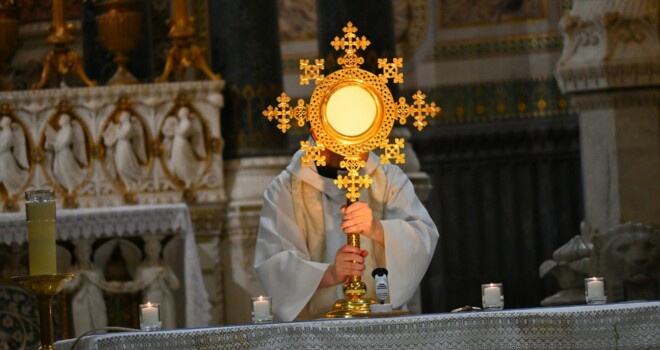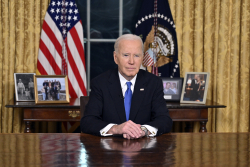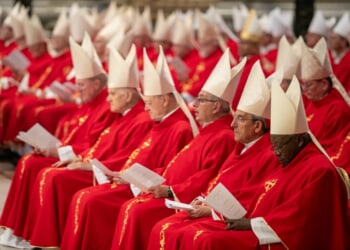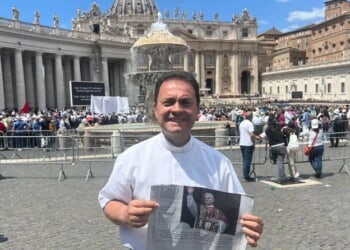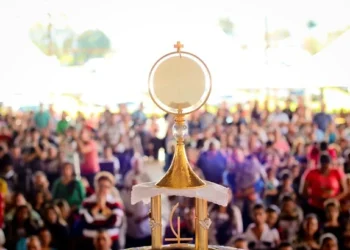The Eucharist is the source and summit of the Christian life. — Lumen Gentium, 11
The election of a new pope is never merely a matter of succession. It is a spiritual moment for the whole Church—a time of anticipation, examination, and hope. In the current conclave, as the College of Cardinals considers who will shepherd over 1.3 billion Catholics into an uncertain future, one question looms larger than most: Will the next pope be a Eucharistic pope?
This is no idle theological wish. It touches the very heart of the Church’s identity. If lex orandi, lex credendi is true—if how we worship shapes what we believe—then a renewed emphasis on Eucharistic theology is not peripheral but essential. As Catholics around the world reawaken to the mystery of the Real Presence through Eucharistic revivals, processions, and adoration, the next pontificate could either amplify this revival or let it flicker out under competing agendas.
A Starving World
In an age of disenchantment, where secularism has replaced sacraments and transcendence is exchanged for algorithms, the Eucharist remains the most radical proclamation the Church can make: God is with us, truly present, Body, Blood, Soul, and Divinity, under the humble appearance of bread and wine.
Pope Benedict XVI called this the Church’s “Eucharistic form” of existence. In Sacramentum Caritatis, he wrote that “the Eucharist makes the Church,” and therefore, “every great reform in the Church is linked . . . to a rediscovery of belief in the Lord’s Eucharistic presence among his people” (6).
The world does not need another papacy marked chiefly by administrative reform or sociopolitical commentary. It needs a pope who will renew the heart of the Church—her Eucharistic heart.
The Crisis Beneath the Surface
Several recent surveys have found that a significant percentage of self-identified Catholics no longer believe in the Real Presence. A 2019 Pew Research study found that only one-third of U.S. Catholics believe that “during Catholic Mass, the bread and wine actually become the body and blood of Jesus.”
We’ve been reading and hearing this for years, in fact. And guess what? That theological erosion has liturgical consequences.
When belief in the Eucharist fades, so does reverence in worship. Pope St. John Paul II lamented this in Ecclesia de Eucharistia, writing, “The Eucharist is too great a gift to tolerate ambiguity and depreciation” (10). The link between doctrine and practice is not optional—it is existential. If Catholics cease to believe in the Eucharist, the Church as Christ intended it cannot survive.
It will fall, then, to the next pope to reinforce both doctrine and devotion: to make Eucharistic coherence—not only in liturgy but in moral life—a defining feature of his pontificate.
Liturgical Reverence and Reform
What would a Eucharistic pontificate look like? A pope grounded in Eucharistic theology would likely exhibit several traits, grounded not in novelty, but in Sacred Tradition:
He would seek to unify the Church around a renewed sense of ars celebrandi—the art of celebrating the liturgy with beauty, reverence, and theological depth. As Pope Benedict XVI taught, “beauty . . . is not mere decoration, but rather an essential element of the liturgical action” (Sacramentum Caritatis, 35). The next pope may call for greater Eucharistic catechesis and for homilies that flow from the mystery of the altar.
A Eucharistic pope would insist that reception of Communion must be in harmony with the moral life. The Catechism reminds us that “anyone conscious of a grave sin must receive the sacrament of Reconciliation before coming to Communion” (CCC 1385). This is not exclusion but mercy—lest the Eucharist become a token rather than a transformative gift. A Eucharistic pope would gently but firmly revive clarity around this sacramental integrity.
He might expand perpetual adoration and Eucharistic processions, emphasizing the contemplative dimension of worship. Pope Francis, despite differences from his predecessor, has upheld this practice, stating: “Adoration means entering the depths of our hearts and allowing Jesus to be our teacher, our guide, and our model” (Corpus Christi Homily, 2018). The next pope could canonically promote adoration in dioceses where it has grown rare.
Evangelization through the Eucharist
A Eucharistic pontificate would proclaim that evangelization begins not with programs but with worship. In Evangelii Gaudium, Pope Francis wrote that “the Church evangelizes and is herself evangelized through the beauty of the liturgy” (no. 24). The Eucharist, rightly celebrated and adored, draws souls to Christ more powerfully than strategies. Perhaps we’re not just seeing a single National Eucharistic Congress once a lifetime.
In a fragmented world, the next pope may need the courage to affirm that public witnesses to the Eucharist—like processions, Benediction, and clear teaching on worthiness—are not “divisive,” but prophetic. This means helping bishops resist political pressure to treat the Eucharist as a cultural symbol instead of a divine mystery.
The Second Vatican Council never intended a liturgical rupture but a revival, rooted in a deeper participation in the Eucharistic mystery. The next pope may be uniquely poised to heal the post-conciliar confusion—not by pitting factions against each other, but by calling the Church back to what she is: a Eucharistic body, nourished by the flesh of Christ. St. Jean Vianney famously said, “All the good works in the world are not equal to the Holy Sacrifice of the Mass.” That is not a devaluation of charity—it is a reordering of priorities. If the Eucharist is truly “the fount and apex of the whole Christian life” (Lumen Gentium, 11), then the Church must be built around it.
The Time Is Ripe
In the United States, the bishops have launched a National Eucharistic Revival and executed a major Eucharistic Congress in 2024. In Latin America and parts of Africa, Eucharistic processions draw thousands. In Europe, where faith has waned, small renewal movements are gathering around adoration chapels. The Holy Spirit appears to be stirring a Eucharistic hunger in every continent.
The next pope can shepherd this into a global moment of renewal—not by inventing something new, but by treasuring what is ancient.
The conclave will rightly consider many factors—age, geography, experience, temperament. But above all, the cardinals should ask: Will this man love the Eucharist enough to let it shape his papacy?
The Church does not need a strategist or a celebrity. She needs a shepherd who knows that the Eucharist is not a symbol to be managed, but a mystery to be adored. The next pope must be, in the deepest sense, a man of the Host.
Photo by Amin Zabardast on Unsplash

